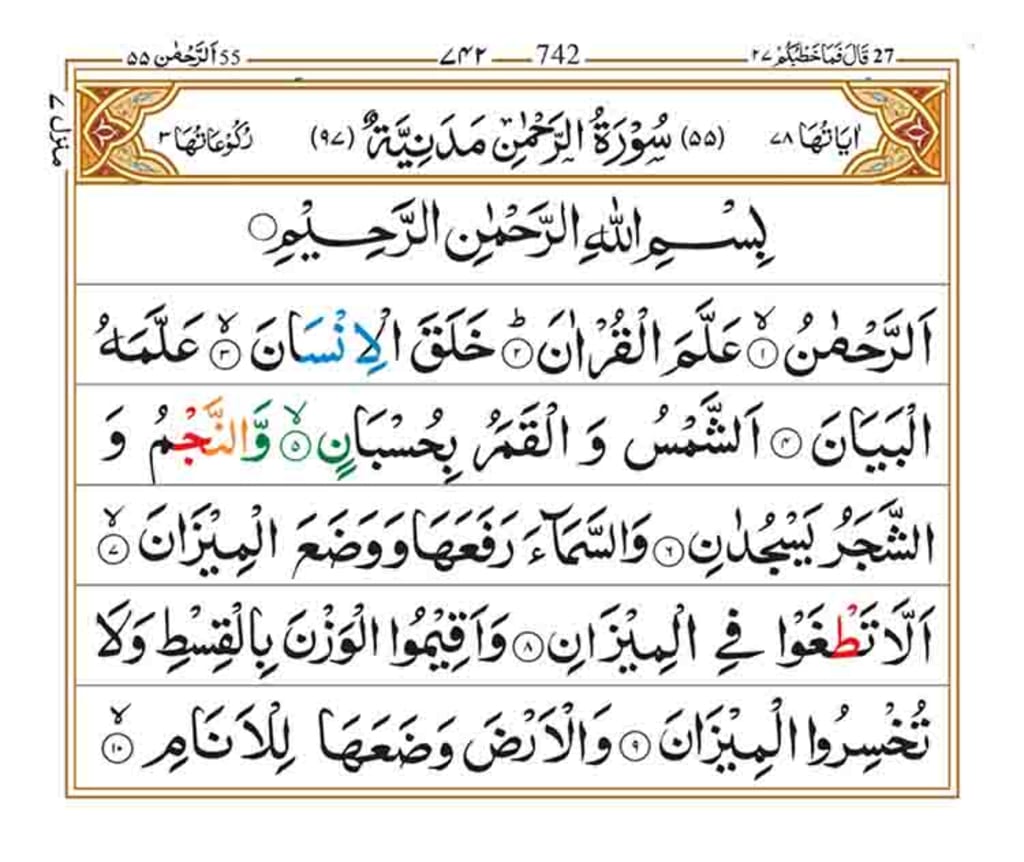
In the intricate tapestry of existence, the Quran, Islam's holy scripture, serves as a guiding light, illuminating pathways towards understanding our purpose and responsibilities as human beings. Among its profound chapters, Surah Rahman stands as a majestic ode to the magnificence of creation and the obligations that come with it. As we delve into its verses, we uncover timeless wisdom that resonates deeply with the essence of human responsibility.
Surah Rahman opens with a resounding proclamation: "The Most Merciful. Taught the Qur'an, Created man, [And] taught him eloquence." (Quran 55:1-4) Here, the divine attributes of mercy and wisdom are intertwined with human creation and the gift of speech. This coupling sets the stage for an exploration of the interconnectedness between humanity and its Creator, emphasizing the responsibilities bestowed upon us by virtue of our existence.
Central to our responsibilities is the recognition of the countless blessings showered upon us by the Divine. Surah Rahman repeatedly poses the question, "Which of the favors of your Lord will you deny?" (Quran 55:13, 55:16, 55:18, etc.), urging introspection and gratitude. From the sustenance provided by the Earth to the celestial bodies adorning the heavens, each blessing serves as a reminder of our interconnectedness with the universe and our duty to steward it with care.
Furthermore, Surah Rahman underscores the inevitability of accountability for our actions. "Then which of the favors of your Lord will you deny? On that Day, none will be asked about his sin, among men or jinn." (Quran 55:55-56) Here, the Quranic narrative transcends temporal boundaries, inviting contemplation on the consequences of our choices not only in this life but also in the Hereafter. It emphasizes the ethical dimension of human responsibility, urging us to reflect on the impact of our deeds on ourselves, others, and the environment.
The Quranic discourse on human responsibility extends beyond mere acknowledgment of blessings to active engagement in acts of compassion and justice. Surah Rahman portrays the mercy of Allah as encompassing all aspects of creation, from the smallest creatures to humanity at large. "So which of the favors of your Lord would you deny? O company of jinn and mankind, if you are able to pass beyond the regions of the heavens and the earth, then pass. You will not pass except by authority [from Allah]." (Quran 55:16-18) Here, the universality of mercy becomes a call to emulate divine attributes in our interactions with others, transcending boundaries of race, religion, and creed.
Moreover, Surah Rahman highlights the imperative of environmental stewardship as an integral facet of human responsibility. "He released the two seas, meeting [side by side]; Between them is a barrier [so] neither of them transgresses." (Quran 55:19-20) Through vivid imagery, the Quran underscores the delicate balance of ecosystems and the sanctity of natural boundaries. As custodians of the Earth, we are tasked with preserving its beauty and integrity for future generations, lest we disrupt the harmony ordained by the Creator.
In essence, Surah Rahman serves as a profound manifesto on human responsibility, weaving together threads of gratitude, accountability, compassion, and stewardship. It challenges us to transcend complacency and embrace our roles as conscious agents of change in the tapestry of existence. As we navigate the complexities of the modern world, let us heed the timeless teachings of Surah Rahman, embodying its principles in thought, word, and deed.
In the grand symphony of creation, our voices echo the melodies of divine grace and wisdom. Let us, therefore, rise to the occasion, embracing our responsibilities with humility and reverence, knowing that in fulfilling our duties, we draw closer to the source of all blessings. For indeed, in the words of Surah Rahman, "So which of the favors of your Lord would you deny?"






Comments
There are no comments for this story
Be the first to respond and start the conversation.